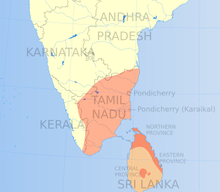Tamil South Africans
| Total population | |
|---|---|
| (600,000 ) | |
| Regions with significant populations | |
| KwaZulu-Natal | |
| Languages | |
| English, Tamil, Afrikaans | |
| Religion | |
| Hinduism, Christianity, others |
| Part of a series on |
| Tamils |
|---|
 |
Tamil South Africans are South Africans of Tamil descent. Tamil people form the majority of Tamil Indian immigrants who came from Tamil Nadu India to Natal, South Africa, from 1860 onwards.. After the expiry of their indentures most of these Indians moved to the cities, becoming established as a thoroughly urban population.[1][2]
Arrival in South Africa
In 1833, the British Parliament passed the Act of Abolition, which banned slavery throughout the British Empire. The consequence of this was that many African slaves in the Colony of Natal decided to desert their former masters. The former masters, lacking sufficient labour force, persuaded the skeptical British authorities in India to implement the system of indentured labour in Natal. On November 16, 1860, 342 men, women and children arrived aboard the S.S. Truro in Port Natal (Durban).
Apartheid
Apartheid alienated all Indians as disenfranchised non-whites, and Hinduism in particular was perceived by many whites as antithetical to Christianity. The imposition of apartheid system also curtailed the opportunities for improvement and included the forced removals program, causing great disruption and social hardship.[1]
Integration
Over the 150 years of residence in South Africa, participation in religion and its many festivals has brought devotees a valuable sense of identity and solidarity, especially in the light of their marginalization and the discrimination experienced under the apartheid system. A recent resurgence of interest in indigenous Tamil festivals seems to reflect a variety of religious, social and political concerns.[1] In South Africa, the Tamil community tends to refer to their religion as "Tamil", rather than Hindu, although this blurring of the distinctions between religion and language also occurs with other Hindu ethnic groups in South Africa.
Education
Tamil was taught in some schools in the KwaZulu-Natal province for several years. Till 1991, the state run schools provided the curriculum, but it was ended. From the year 2014, Tamil can be chosen as a third language in state run schools in KwaZulu-Natal province.[3][4]
Festivals
Puratassi is the Tamil word for September. Purtuassi, the mispronounciation of purattassi, is used widely in South Africa. The people don't eat anything on the first day, to celebrate the festival. Temples in Durban hold grand Purtassi prayers. In Durban, a lot of preparation goes into this prayer as devotees fast on the prayer day. [5] People also celebrate mariamman festival. Mariamman means rain mother. The Mariamman festival is held at local temples and households and is referred to as the porridge jol in local Durban slang by the Tamil community.[6] cavadee is another famous festival among the Tamil community in KwaZulu-Natal province.[7]
See also
- Sri Lankan Tamil people
- Tamil Malaysians
- Tamil Canadians
- Thai Poosam Kavady festival in South Africa
- Thai Pongal
- Tamil people
- Tamil diaspora
- Indians in Singapore
- Indian South Africans
References
- 1 2 3 Diesel, Alleyn (2000). "Tamil Hindus in KawZulu-Natal (South Africa): History, Identity and the Establishment of Their Place in the New South Africa". Proceedings from the International Association for the History of Religions. International Association for the History of Religions (IAHR),.
- ↑ K. Chetty. "Caste and Religions of Natal Immigrants". Gandhi-Luthuli Documentation Centre. Retrieved 2007-11-19.
- ↑ Tamil as a third language in south african schools
- ↑ five indian languages - Kwazulu - Natal Education Ministry
- ↑ Puratassi celebrations
- ↑ mariamman festival in durban
- ↑ cavadee in south africa
- Bhana, Surendra; Panchai, Bridglal (1984). A Documentary History of Indian South Africans (Black and White Perspectives on South Africa). Hoover Institution Press. p. 306. ISBN 0-8179-8102-0.
